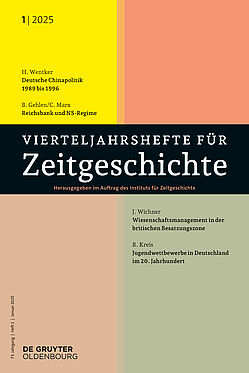- The Institute
- Research
- Dictatorships in the 20th Century
- Democracies and their Historical Self-Perceptions
- Transformations in Most Recent History
- International and Transnational Relations
- Edited Source Collections
- Dissertation Projects
- Completed Projects
- Dokumentation Obersalzberg
- Center for Holocaust Studies
- Berlin Center for Cold War Studies
- Publications
- Vierteljahrshefte
- The Archives
- Library
- Center for Holocaust Studies
- News
- Dates
- Press
- Recent Publications
- News from the Institute
- Topics
- Reordering Yugoslavia, Rethinking Europe
- Munich 1972
- Confronting Decline
- Digital Contemporary History
- Transportation in Germany
- German Federal Chancellery
- Democratic Culture and the Nazi Past
- The History of the Treuhandanstalt
- Foreign Policy Documentation (AAPD)
- Dokumentation Obersalzberg
- Hitler, Mein Kampf. A Critical Edition
- "Man hört, man spricht"
- IfZ
- Vierteljahrshefte
- VfZ Archive
- Issue Index
- 2025
- Issue January 2025
Issue 1/2025
Content Overview: English Titles and Abstracts:
- Hermann Wentker, A Difficult Partnership. Germany’s China Policy between Human Rights Aspirations and Economic Interests, 1989 to 1996 - A deeper look into the issue
- Boris Gehlen/Christian Marx, The Executive Leadership of the Reichsbank and the National Socialist Regime - Free access until the publication of the next issue
- Jessika Wichner, Research Management in the British Zone of Occupation. The Research Branch between Control and Research Promotion, 1945 to 1951.
Reinhild Kreis, Young Talent for a Performance-Oriented Society. Youth Competitions in Twentieth-Century Germany.
Abstracts
Hermann Wentker, A Difficult Partnership. Germany’s China Policy between Human Rights Aspirations and Economic Interests, 1989 to 1996
The Tiananmen Square Massacre on 4 June 1989 marked a turning point in German-Chinese relations, which had shown a positive trend after Deng Xiaoping’s accession to office. The human rights issue became a key element of Germany’s China policy, previously driven mostly by economic interests. In the early 1990s, Germany’s policy on China was situated in a dynamic triangle: The question is what role the Bundestag, the business lobby and the development of Chinese politics played for the German Federal Government and in particular the Federal Foreign Office. Special attention is given to the question of the relative importance of human rights and the significance of the arguments used to support the expansion of relations with China despite its violations of human rights.
Boris Gehlen/Christian Marx, The Executive Leadership of the Reichsbank and the National Socialist Regime
Under the management of its self-confident president Hjalmar Schacht, the Reichsbank presented itself as a stronghold of rational monetary policy during the Nazi era. Although it began to contribute to the secret financing of rearmament by means of Mefo bills in 1933, within a few years it criticized the inflationary effects of the exorbitant spending policies. For this reason, Hitler dismissed most of the top management in January 1939. From then on, the Reichsbank served as a willing instrument of the Nazi policies of race, conquest and extermination. Boris Gehlen and Christian Marx examine the hitherto largely unnoticed executive leaders of the Reichsbank and their individual career paths. They discuss the top executives’ involvement in Nazi policy and analyze the narratives and strategies by which the actors sought to justify themselves afterwards.
Jessika Wichner, Research Management in the British Zone of Occupation. The Research Branch between Control and Research Promotion, 1945 to 1951
After the Second World War, the applied natural sciences and engineering were banned in Germany according to Allied Control Council Law No. 25. On the British side, the Research Branch of the British Control Commission was responsible for monitoring research activities. It was also responsible for restructuring the scientific landscape of the British Zone of Occupation and for supporting research projects by German scientists that were outside the purview of Law No. 25. Drawing on an in-depth study of the sources, Jessika Wichner examines the diverse activities of the Research Branch between 1945 and 1951 and arrives at surprising conclusions.
Reinhild Kreis, Young Talent for a Performance-Oriented Society. Youth Competitions in Twentieth-Century Germany
During the 20th century, a growing number of fields of activity were transferred to competition formats. Competitions for children and adolescents especially became a mass phenomenon, which was simultaneously attractive to democracies and dictatorships, in market as well as planned economies. Reinhild Kreis explores the competitions as a means of shaping social and economic orders in their continuities and ruptures for the Nazi State, the Federal Republic of Germany and the GDR. The contests are interpreted as practices of attributing achievement, which were meant to shape patterns of thought and behaviour and thereby influence both individual and collective futures.








